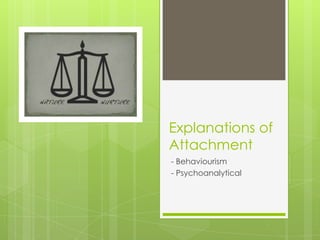
Explanations of Attachment
- 1. Explanations of Attachment - Behaviourism - Psychoanalytical
- 2. The Behaviourist Approach - Learning We are all born a blank slate….. We learn how to behave or respond, nothing is innate.
- 3. Classical Conditioning Learning occurs through association. Food (unconditioned stimulus) produces a sense of pleasure (unconditioned response). The person who feeds the infant becomes associated with the response and becomes the conditioned stimulus. Association between the individual and a sense of pleasure creates attachment. http://www.youtube.com/
- 4. Little Albert (Watson 1920) What was the UCS, UCR, CS and the CR? http://www.youtube.com/
- 5. Operant Conditioning Learning occurs through reinforcement. If we are positively reinforced (rewarded) for behaving in a certain way, we will repeat the behaviour. We learn through the consequences of our behaviour. An experience which is unpleasant is a punishment and should decrease the likelihood that the behaviour will be repeated. http://www.youtube.com
- 6. Supernanny Classical or operant conditioning? http://www.youtube.com
- 7. Psychoanalytical Approach Infants are born with an innate drive to seek pleasure – pleasure principle. They demand immediate satisfaction and the person providing this satisfaction becomes the love object. Attachment is therefore formed with this person.
- 8. Cupboard Love Theories Do we only form attachments to the people who feed us?
- 9. Activities – Pages 3-5 1. How did Dollard and Miller (1950) explain attachment? 2. Complete an evaluation of the Behaviourist and Psychoanalytical Approach. 3. Write an overview of Harlow’s (1959) study – why does it challenge the cupboard love view? 4. Copy down key terms.